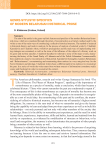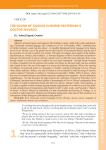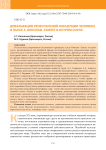Русское и зарубежное литературоведение. Рубрика в журнале - Сибирский филологический форум

Genre-stylistic specifics of modern Belarusian historical prose
Статья научная
The aim of the article is the genre-stylistic features and specifics of the modern Belarusian historical prose, which are considered through the prism of reconstruction as a literary method used by the writer as one of the main ways of constructing a collective historical memory. The method of research is historical-literary and motivic analysis. In the process of analysis of selected works by Uladzimir Karatkievic and Uladzimir Arlou, worldview prerequisites and the main ways of implementing writing strategies are examined, as well as the issue of the influence of the subject of a literary work on its genre and stylistic specifics. Uladzimir Karatkievic referred to some of the major events, characterizing the history of the Grand Duchy of Lithuania and of the Polish-Lithuanian Commonwealth, then undertook a massive reconstruction of that period. Karatkievic thoroughly examines Belarusians and “Belarusianness”, reconstructing and constructing these notions in a very untypical way for the Soviet literature and ideology. Uladzimir Arlou chose a different path in his endeavor to reconstruct the past. In a series of works the writer starts from written sources of information (sometimes really scarce and fractional) in order to reconstruct the context.
Бесплатно

The sound of silence in Boris Pasternak's Doctor Zhivago
Статья научная
Influence of classical music and composers like Scriabin is clearly visible in the syntax and phonology of Pasternak’s poetical language. His “composer’s ear” [cf. in De Mallac, 1981] - profound sense of rhythm, harmony, sound, but also silence - is traceable throughout literary language in his famous novel Doctor Zhivago, one of the greatest novels about the fall of the Imperial Russia, and the end of the monarchy in war and revolution ever written. This paper investigates some aspects of the relationship between art, violence, and revolution, i.e. between imaginary world of revolutionary and postrevolutionary (Soviet) Russia in Doctor Zhivago, and the ways in which the novel captivates those events through sounds of a crowd and city in turmoil, but even more importantly - through intense moments of silence. Departing from the premises that sounds and silence are physical states, but also aesthetic and cultural devices, the aim of this paper is to answer the following questions. What is the meaning of antithesis of sound and silence as a metaphor of “double” meaning in Pasternak’s Doctor Zhivago where silence indicates violence, war, and revolution as well as contains in itself the energy of creation, creative impulse? Especially in relation to “paradoxical materiality” [Miller, 2007] of silence, where this state of complete muteness and stillness represents simultaneously emptiness - but also plentitude, weightlessness - but also heaviness, the paper analyzes the symbolism of silence in Pasternak’s novel. Is Pasternak’s profound uses of silence signifier of an amputation of Doctor Zhivago’s protagonists from the world of violent revolutionary Russia into their own, private, intimate worlds of introspection, or it is rather a signifier of their resistance against popular representation of revolution as universal political and cultural project of emancipation and freedom for all? In other words, can Pasternak’s “rhetoric of silence” in Doctor Zhivago be understood as a state of plentitude and knowing (S. Sontag), i.e. as a method of radical speech of silenced and whispering protagonists rather than of their muteness as a consequence of their (bourgeois) laid-backness and passivity?
Бесплатно

Девальвация ренессансной концепции человека в пьесе А. Николаи "Гамлет в остром соусе"
Статья научная
В статье пьеса современного итальянского драматурга Альдо Николаи «Гамлет в остром соусе» рассматривается как ярчайший пример постмодернистского переосмысления ренессансной модели гуманизма и порожденной ею концепции человека. Драматург вступает в межкультурный диалог с трагедией Уильяма Шекспира «Гамлет, принц Датский», чтобы показать на примере образа Гамлета современное положение гуманистических ориентиров прошлого. Целью статьи становится выявление специфики художественного отображения ренессансной концепции человека в пьесе «Гамлет в остром соусе», а соответственно, и ее актуальности, жизненности в постсовременном пространстве культуры. Методологической базой исследования являются труды А.А. Смирнова, А.А. Аникста, освещающие ренессансно-гуманистические основания шекспировского творчества, а также работы H.A. Бердяева, А.И. Извекова, посвященные кризисным периодам существования европейского гуманизма в XX веке, в частности в контексте антропологического кризиса. В пьесе Альдо Николаи шекспировская трагедия переосмысляется с «точки зрения» ее предполагаемых второстепенных персонажей - кухонной прислуги, что позволяет автору подвергнуть деконструкции событийную основу трагедии о принце Гамлете и образ ее центрального персонажа. В результате сравнительно-сопоставительного анализа доказывается, что переосмысление шекспировской метафоры «мир - театр» обусловлено изменением функции персонажей в пьесе «Гамлет в остром соусе». Децентрация, деконструкция, сатирическое переосмысление, аксиологическое опустошение образа датского принца, окруженного в итальянской пьесе гедонистическими, гомосексуальными, гастрономическими мотивами, позволяет сделать вывод о девальвации гуманистической концепции человека, оказавшейся несостоятельной в эпоху постмодерна.
Бесплатно

